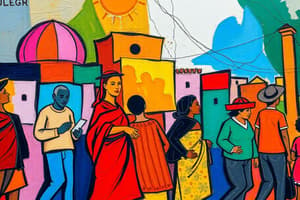Podcast
Questions and Answers
Past events like wars and trade have played a minimal role in forming the current cultural mixes in various regions.
Past events like wars and trade have played a minimal role in forming the current cultural mixes in various regions.
True (A)
Cultural exchange programs are essential for fostering understanding between diverse cultural groups.
Cultural exchange programs are essential for fostering understanding between diverse cultural groups.
True (A)
Multicultural diversity solely focuses on the presence of different ethnic groups within a geographic area.
Multicultural diversity solely focuses on the presence of different ethnic groups within a geographic area.
False (B)
Providing language support is unnecessary for facilitating interactions in multicultural environments.
Providing language support is unnecessary for facilitating interactions in multicultural environments.
Language barriers can sometimes enhance the effectiveness of interactions among diverse cultural groups.
Language barriers can sometimes enhance the effectiveness of interactions among diverse cultural groups.
Countries with significant histories of immigration often showcase both successful and unsuccessful integration of immigrants.
Countries with significant histories of immigration often showcase both successful and unsuccessful integration of immigrants.
One of the societal benefits of multicultural diversity is improved global relations through understanding different cultures.
One of the societal benefits of multicultural diversity is improved global relations through understanding different cultures.
Increasing cultural sensitivity through education is unimportant in reducing conflict among diverse populations.
Increasing cultural sensitivity through education is unimportant in reducing conflict among diverse populations.
Economic benefits related to multicultural diversity arise from a homogeneous talent pool.
Economic benefits related to multicultural diversity arise from a homogeneous talent pool.
Integration issues faced by cultural groups are typically unrelated to societal acceptance.
Integration issues faced by cultural groups are typically unrelated to societal acceptance.
Flashcards
Multicultural Diversity
Multicultural Diversity
The presence of multiple cultural groups within a society or area, encompassing factors like ethnicity, religion, and values. It goes beyond just coexistence and focuses on the dynamic interactions among these groups.
Benefits of Multicultural Diversity
Benefits of Multicultural Diversity
The positive impact of diverse cultures, leading to broader perspectives, increased innovation, economic growth, and a more inclusive society.
Challenges of Multicultural Diversity
Challenges of Multicultural Diversity
Challenges arising from cultural differences, including potential conflicts, integration difficulties, communication barriers, and social inequalities.
Immigration
Immigration
Signup and view all the flashcards
Globalization
Globalization
Signup and view all the flashcards
Managing Multicultural Diversity
Managing Multicultural Diversity
Signup and view all the flashcards
Promoting Intercultural Dialogue
Promoting Intercultural Dialogue
Signup and view all the flashcards
Inclusive Policies and Practices
Inclusive Policies and Practices
Signup and view all the flashcards
Language Support and Resources
Language Support and Resources
Signup and view all the flashcards
Cultural Sensitivity Education
Cultural Sensitivity Education
Signup and view all the flashcards
Study Notes
Defining Multicultural Diversity
- Multicultural diversity refers to the presence of multiple cultural groups within a given society or geographic area.
- This encompasses a wide range of factors, including ethnicity, nationality, religion, language, and values.
- It implies more than just the presence of different groups; it also considers the dynamic interplay and interactions among them.
- Diversity is often viewed positively, as it promotes innovation, creativity, and understanding of different perspectives.
Benefits of Multicultural Diversity
- Increased cultural exchange and understanding: Exposure to different cultures broadens perspectives and fosters empathy.
- Economic benefits: Diverse talent pools can contribute to innovation, economic growth, and increased productivity.
- Social and political benefits: Increased tolerance and respect for others leads to a more inclusive and harmonious society.
- Enhanced creativity and problem-solving: Diverse groups often generate more creative solutions to problems due to varied approaches and perspectives.
- Improved global relations: Understanding and appreciating different cultures is vital for building strong and positive relationships among nations.
Challenges of Multicultural Diversity
- Potential for conflict and misunderstanding: Differences in values and beliefs can sometimes lead to conflict.
- Integration and assimilation issues: Different cultural groups may face challenges in integrating into a new society or maintaining their culture.
- Language barriers: Communication barriers can hinder effective interactions and create social divisions.
- Social inequalities and discrimination: Prejudice and discrimination can result in unequal access to resources and opportunities for certain groups.
- Cultural clashes and misunderstandings: Disagreements regarding customs, traditions, or social norms can strain intercultural relations.
Factors Contributing to Multicultural Diversity
- Immigration: Movement of people across borders brings diverse cultural backgrounds into contact with each other.
- Migration: People may migrate due to various reasons, such as work, education, or political instability, enriching the multicultural landscape.
- Globalization: Increased interconnectedness through trade and communication brings different cultures in closer contact.
- Historical events: Past events like wars, colonization, and trade have significantly shaped the current mix of cultures in many places.
- Cultural exchange programs: Initiatives aimed at promoting interaction and understanding between different cultural groups are essential to fostering diversity.
Managing Multicultural Diversity
- Promoting intercultural dialogue and understanding: Facilitating interactions and exchanges that encourage empathy and respect.
- Developing inclusive policies and practices: Creating frameworks that support the inclusion of diverse perspectives and backgrounds within institutions.
- Addressing discrimination and prejudice: Actively combating biases and promoting equal opportunities for all groups.
- Providing language support and resources: Supporting individuals to learn new languages can reduce communication barriers and facilitate interaction.
- Encouraging cultural sensitivity education: Increasing awareness of various cultures through education is crucial to reducing conflict and promoting harmony within diverse populations.
Examples of Multicultural Diversity
- Countries with a strong history of immigration, such as the United States, Canada, Australia, and the United Kingdom: These countries have many examples of successful and unsuccessful integration of immigrants and their cultural heritage.
- Larger urban areas around the world: Cities often attract people from different parts of the world, creating a melting pot of cultures.
- Schools or workplaces with a diverse employee or student body: These environments provide practical examples of how to manage multicultural diversity, such as by fostering understanding across different cultural backgrounds.
- Online communities or social media platforms: Online environments may bring together people from different cultures to discuss or share experiences.
Studying That Suits You
Use AI to generate personalized quizzes and flashcards to suit your learning preferences.
Description
Explore the concept of multicultural diversity, which encompasses the presence of multiple cultural groups within a society. This quiz examines the benefits associated with diversity, including cultural exchange, economic growth, and enhanced creativity. Test your knowledge on how understanding different cultures can lead to a more inclusive society.




